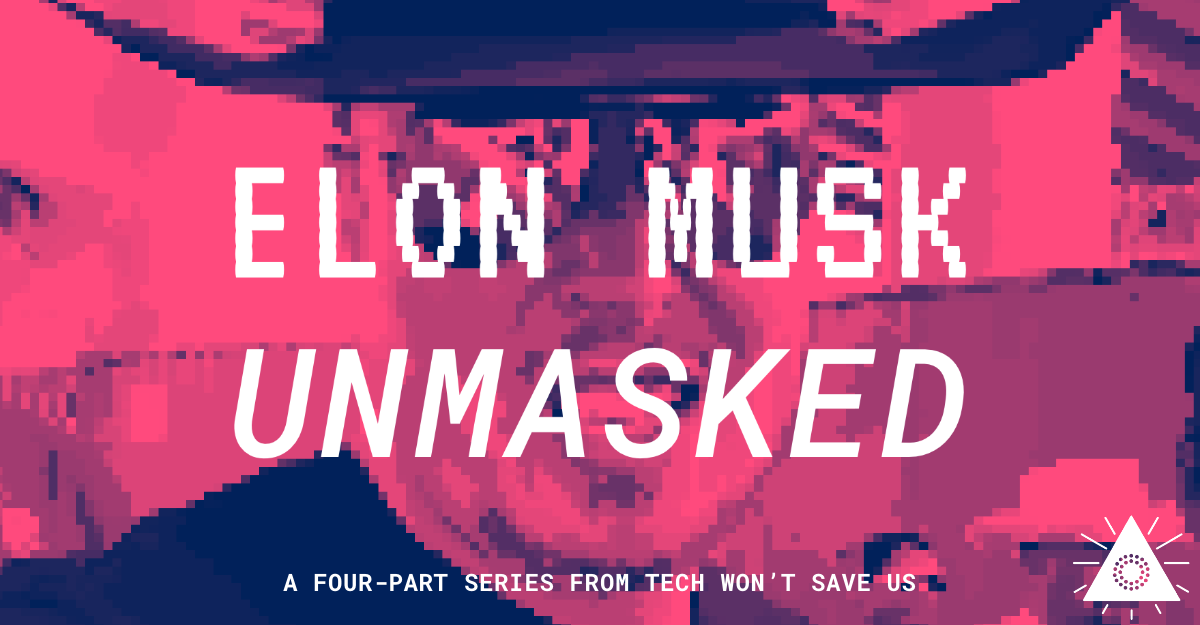
For far too long, Elon Musk was let off the hook for the externalities of his businesses because he was making electric cars and rockets and whipping up a hysteria in the process. Much of the media was happy to look past the harm he caused in pursuing his fantasies, and as a result much of the public didn’t even know it was happening.
Elon Musk Unmasked will give you a different perspective on the man, without the layer of boosterism that usually surrounds him. The series explores the inspirations that motivated Musk from a young age, how he learned that exaggeration and spectable was the ticket to fawning media coverage, the real story of how he built his business empire, and the very real risks that come of the power he’s been able to accumulate.
The series is hosted by Paris Marx. He’s been called the left’s leading Muskologist and has been writing about Musk and his companies since the mid-2010s. Beyond hosting Tech Won’t Save Us for over three years, Marx also wrote a book published last year called Road to Nowhere: What Silicon Valley Gets Wrong about the Future of Transportation where Musk and his ridiculous transport ideas get ample attention.
We need to wake up the threats a powerful, wealth, and increasingly radicalized Elon Musk poses to the world. Elon Musk Unmasked is one step in that direction.
Part 1: Origins of an Oligarch
Since most people only know about the past decade of his life at most, we start with a dive into his history and the experiences and stories that shaped him to set a foundation for some of the deeper issues we’ll be exploring. This episode explores the years in Elon Musk’s life before he became anyone of note in Silicon Valley. We trace his journey from South Africa through Canada to the Bay Area, and go back to look at his family life and the influences that shaped him — from his insatiable appetite for science fiction to his upbringing in apartheid South Africa. We begin to see how Musk changes his story to suit his own purposes.
Listen now »
Part 2: Creating the Genius Myth
Elon Musk is a man, there’s no doubt about it, but he’s also a character that he began to create on his own and then informally partnered with the media to take to a level he likely could have never imagined in those early days. In the second episode, we dig into how building the character of Elon Musk took time and work. It required exaggerating some aspects of his personality, wholly fabricating others, and ignoring or explaining away the pieces that distracted from the image of a paragon of progress. It was a challenging project, and those they questioned it could face real consequences.
Listen now »
Part 3: Building An Empire
Elon Musk’s companies always have a grand vision built around them, but it’s important not to get distracted by the public relations aso we can understand the foundations of those businesses, the real impacts they have, and how Musk actually uses them. In the third episode, it becomes clear that when you look past the rhetoric that Musk tells the public — and surely himself too — you often see quite a different picture than the marketing language suggests. He downplays the support of the government and hypes up the societal benefits while severely exploiting the workers below him who are responsible for his companies’ success. It’s only by challenging the stories he tells that we can start to see Musk and his capitalist empire for what they really are.
Listen now »
Part 4: Shaping the Future
Elon Musk continues to expand his empire and tells his supporters he’s not following his personal whims, but is acting for the betterment of humanity. We need to be able to question not just his claims, but the deeper assumptions driving them. In the final episode, we explore how just because he feels he’s found the secret to humanity’s future doesn’t mean he’s right. What are his driving motivations, and where do his ideas for the future come from? If they’re realized, will they really deliver the widespread benefits he claims, and perhaps even more importantly, should we be trying to realize them at all? Those are key questions to consider as we explore the deeper impacts he’s having on our society.